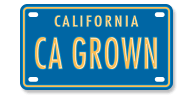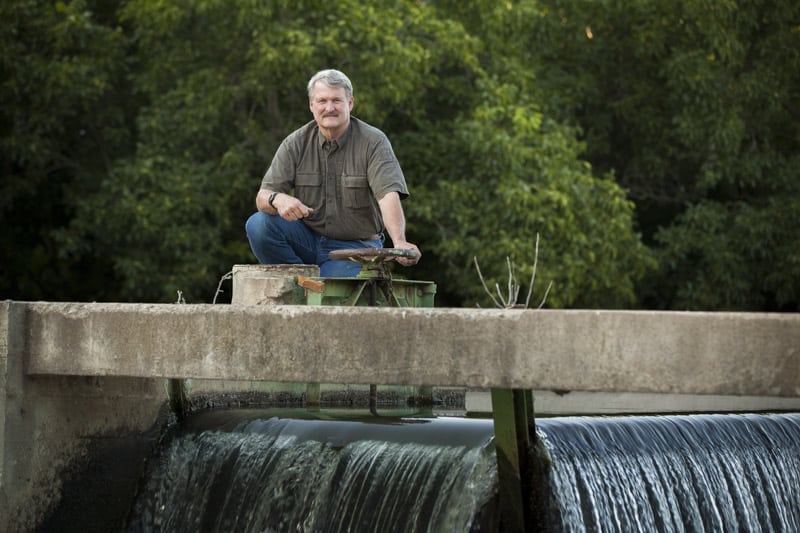Meet a Farmer: Paul Wenger of Wood Colony Nut Company
Paul Wenger is a third generation farmer and former president of the California Farm Bureau Federation who has dedicated his life to farming and advocating on behalf of fellow farmers. His passion and love for the land is evident in everything he does from walking fields to hiking mountains. He farms almonds and walnuts in Modesto, California alongside two of his three sons.
What are you doing today?
Today with the rain, we are cleaning out the shop and working on equipment. The rain will bring on fungal problems so we are getting prepared so that when the weather clears and the fields dry out, we’ll be ready to protect our crop. On rainy days, we are always in the shop getting caught up and ready for the sunny days when we can get out in the fields again.
What is your favorite part of farming?
Favorite part of farming is that we are never certain what we will be doing tomorrow. Weather dictates what we do on a daily basis. We know what we are going to be doing today, but tomorrow is often unpredictable. That’s what I love about farming because it is never the same thing. You can’t rely on what worked last year working in the same way for you this year. We went through 3 years of dry conditions followed by a lot of rain last year and then this year, it is different again. It’s the unpredictability in farming that I love. Our cultural practices change according to the weather.
With farming, you are always learning. Good judgment comes from experience and experience comes from bad judgment. Sometimes you guess right and look smart; sometimes you guess wrong and look really stupid. Weather often determines whether you are really smart and a visionary or just silly.
How do you give back to the community?
We live in the Wood Colony area here in Modesto. We support Modesto JR College, the local 4H and FFA. We feel it’s important to support the young people that are our future. I served 11 years as a voluntary fireman with the Salida Fire Department and we continue to support the fire department.
What drew you into farming?
It was in my blood. In the 80s, people said don’t farm because there is no future in it so I went to Cal Poly to become a Veterinarian. My Dad was ready to retire and lease the ranch but I wasn’t sure I could make a living at it. My Dad told me if I really loved it and really wanted to do it, that I would be successful. So I came home and for 5 years, our focus was all farming. My wife takes care of all the accounting. We’ve been very blessed. My Dad told me to try and hang onto the income in the good years to offset the bad years. That has become more challenging with increased regulatory costs and the taxes we have to pay in California. You have to work really hard to make money, and just as hard to keep it. I like the challenges of farming, the seasons, the harvest, the late nights. When folks said I couldn’t make a living at farming, I needed the nudge from Dad to say if you want to you will be successful. I am blessed to be able to grow the farm. If you are going to farm, you need to find the best land and water available.
What are your hobbies or past times when you are not farming?
I have hiked in the past and I’ve had the good fortune to have climbed Shasta, Mt. Whitney, and Kilimanjaro. I’ve hiked in Patagonia and Sikkim, India. My wife and I like to go on short 3-4 day trips. I like being home seeing the sun come up and the sun set in my fields and I’m just really happy working. I’m very much like a landlord I had once, if you blindfold me, spin me around, and look down at the ground, I can tell you where I am in my fields. That’s how well I know my fields.
What advice would you give to someone who wants to start farming?
Make sure you love it, and are willing to work hard at it. Farming is a great way of life, but it should also be a good way to make a living. Growing up my dad never took vacations. If you want your weekends, evenings and holidays, then don’t farm. Farming means committing to long days and hard work and above all, you have to love it!
What are one or two things you do on the farm to be sustainable?
Everything we do is sustainable. If you’re going to stay in business, you have to be sustainable in every area. We have less control over our the prices we receive for our crop, so we can and do control our costs by using IPM (Integrated Pest Management), softer materials, and water conservation. The things we are doing today are very pest specific. We work hard to deliver the right amount of fertilizer at the right time and at the right place so that our nutrients feed our crops and not end up where we don’t want them. Everything we do is focused on practices that are good for the crop and good for the environment, while saving money so that we continue to be sustainable.


hi i live on california ave down the street from your walnuts and was wondering if you wanted someone to take the branches that are cut on the road
Hi Stella, we are not affiliated with Wood Colony Nut Company we just wrote an article about them. You will need to reach out to them directly.